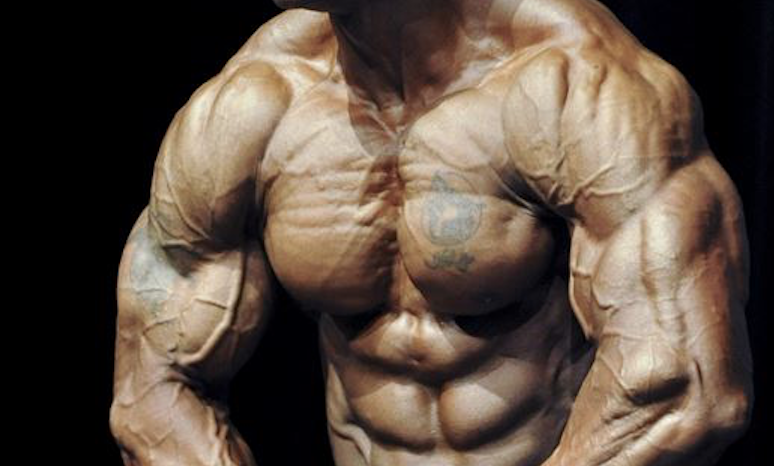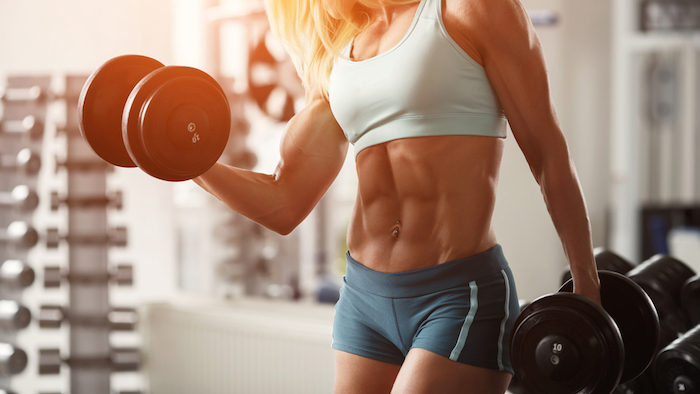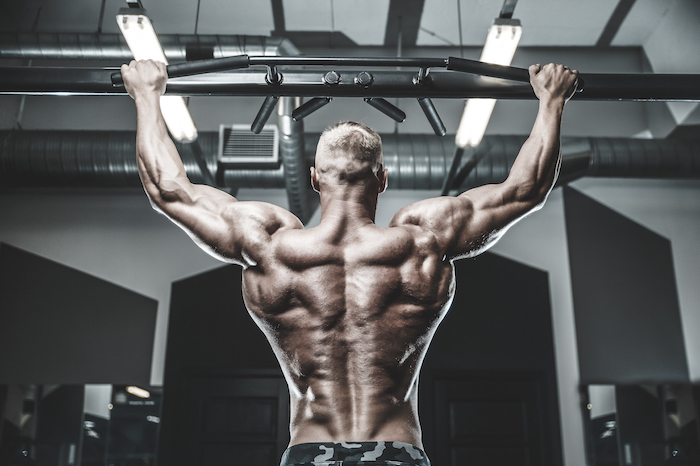There’s actually not much evidence exercise increases testosterone.
That may sound like heresy, but of all the topics out there in the world of fitness and supplementation, increasing testosterone may be the one that’s most myth-ridden. We’ve looked at dozens of studies and interviewed a PhD in Sport Physiology to help us answer some of the most controversial questions in his area of expertise. In this article, we’ll address the following topics and what people tend to get wrong with them — and people get a lot wrong with them.
- Does exercise increase testosterone?
- Natural ways to boost testosterone
– Micronutrients
– Body fat - Testosterone boosting supplements
– D-aspartic acid
– DHEA - Androgen sensitivity: the forgotten factor
(Editor’s note: The content on BarBend is meant to be informative in nature, but it shouldn’t take the place of advice and/or supervision from a medical professional. The opinions and articles on this site are not intended for use as diagnosis, prevention, and/or treatment of health problems. Speak with your physician if you have any concerns.)
Does Exercise Increase Testosterone?
- Little evidence suggests that lifting weights increases testosterone to a practical degree
Testosterone is important and having suboptimal levels means that, well, your health may be suboptimal. Healthy levels of testosterone have been linked with heart health, bone strength, cognition, mood, and libido.(1)(2)(3)(4)(5)(6)
That link with muscle gain? Well if you’re taking a lot of anabolic steroids — which we strongly advise against — then you’ll have many times the normal amount of testosterone in your body and that would likely increase muscle size.
If you’re doing everything you can naturally to increase your testosterone? The healthy range is pretty wide and without injecting it, any increases in T that you might produce yourself probably aren’t affecting your muscle that noticeably.
“They’ve done a considerable amount of research on the degree to which normal ranges of testosterone production varies in human, the 300 to 900 nanograms per deciliter range,” says Dr. Mike Israetel, sports physiologist and Head Science Consultant at Renaissance Periodization. “They have a very hard time demonstrating that being at the top or bottom of that range is going to reliably result in boosting any amount of muscle, and certainly not any amount of muscle you can measure in months.”
You might be asking, but lifting weights builds muscle because it increases your testosterone, right? It’s actually debatable as to whether it’s the act of lifting weights or the feeling of accomplishment that results in the increase, but whatever the mechanism, the amount that T increases from lifting is usually in the area of about 10 percent or less, and it’s very temporary.(7) And some research questions whether or not that increase really happens at all.
The amount that T increases from lifting is usually in the area of about 10 percent or less, and it’s very temporary.

For example, a 12-month long randomized clinical trial found no increases in testosterone among guys doing regular aerobic training.(8) Another study from 2012 found no significant correlations with T in a 12 week strength and hypertrophy program, and the studies that do find an increase say it’s significant, but again, relatively small and temporary.(9)(10) There’s also not much evidence that having bigger muscles alone, independent of anything else, means you have more testosterone than someone else.
“But even if you double the amount of testosterone you normally have, if you’re in the normal range… over your lifetime it will probably increase muscularity, all things being equal, but it’d just be a really small amount,” says Israetel. “We go back to studies where over the course of a week having four or five hard workouts might increase your testosterone by ten percent total. There’s no machine on Earth that can detect that little amount of muscle growth that even theoretically that would cause.”
Now lifting weights does produce a more dramatic increase in your growth hormone, plus it’s great for a ton of other hormones and reactions that help with muscle growth.(7)(11) But the specific link with testosterone, lifting weights, and bigger muscles really isn’t quite as strong as people think.
[Learn more: How to naturally boost growth hormone.]
Natural Ways to Boost Testosterone
Still, having low T is associated with a ton of health problems like depression, impotence, reduced bone mass, and other problems. So if you’re low in testosterone, what can you do to get it to normal ranges? Note that this is different from getting your testosterone to superhuman levels — but what if you just want to make sure your testosterone levels are healthy?
Micronutrients
- A broad spectrum of nutrients and consuming sufficient calories is important
- Research highlights the importance of Vitamin D and dietary fat in particular
It’s not unanimous, but some research points to Vitamin D: most people are deficient in it, and there’s decent evidence to show that supplementing or spending more time in the sun can help to bring them to normal levels.(12)(13)(14) Zinc and magnesium also have some under researched connections, but there’s more you should know.(15)(16)
“I think that can be said for a variety of nutrients including cholesterol, and dietary fat, saturated fat, definitely essential fats, and probably to a large extent carbohydrate as well. And possibly protein,” says Dr. Israetel.(17)(18)(19)(20)(21) “And lastly, calories. That’s probably the most important. If you are hypocaloric, it doesn’t really so much matter where your nutrients come from. The optimization of getting enough Vitamin D, enough fat, enough carbs, and so on and so forth has an effect, but it’s a smaller effect than just eating more food.”
While some nutrients are more closely associated with testosterone than others, so many of them are linked to healthy T that the slightly oversimplified answer seems to be to eat the right amount of calories and micronutrients that the human body needs, instead of focusing too much on one of these factors to the exclusion of others.
[Keep up your calories and micronutrients with our picks for the best meal replacements!]

Body Fat
- Both too high and too low levels of body fat may decrease testosterone
Of course, the advice to get plenty of calories doesn’t mean you should eat as much as you can every day. There’s good evidence that obesity reduces testosterone — but there’s also good evidence that very low body fat also decreases testosterone.(22)(23)(24) The solution, of course, is to have healthy, moderate levels of body fat.
This is important to note because a lot of people who worry about testosterone levels are bodybuilders, and some articles out there might lead them to believe that slashing body fat and increasing muscle as much as possible is going to make your testosterone sky high. But actually if you’re spending a lot of time under 10 percent body fat, it may be working against you.
If you’re spending a lot of time under 10 percent body fat, it may be working against you.
“A lot of individuals diet for the first time and do their first show and they get down to five percent body fat and they get it in their minds that they’re going to stay super lean because they like how it looks and they don’t want to diet too much for their next show,” says Dr. Israetel. “So let’s say they come up to eight percent body fat — they’re almost guaranteeing themselves suboptimal testosterone concentrations and suboptimal results, among many other things.”
[Read more: 7 Downsides of Being Crazy Lean.]
To summarize so far for natural lifestyle strategies to keep your T healthy:
- Eat enough calories
- Keep your body fat to a healthy level
- Don’t get too low in dietary fat or any essential nutrients
You also really want to manage your stress and your sleep. The link between low testosterone and sleep disorders is very strong, and it might be a reason why a few studies have made that link between exercise and magnesium to better testosterone, as they both help to improve sleep quality.(25)(26)
[Check out Ben Pollack’s 3 tips for restful sleep after heavy lifting.]

Testosterone Boosting Supplements
- No over-the-counter supplements reliably increase testosterone to a practical degree, though more research is needed
So you’re a healthy person. You eat well, you’ve got a healthy amount of body fat, you get plenty of sleep, and you feel like you’ve made all the lifestyle changes you can make to naturally optimize your T. And you’ve picked up a supplement that you know is going to skyrocket your testosterone and give you an edge.
If it’s legal and over the counter, it doesn’t seem likely. Let’s talk about two of the most popular “testosterone boosters.”
D-aspartic acid
D-aspartic acid is an amino acid you can get at your local supplement store right now and it has a bunch of studies linking it to higher testosterone.(27)(28)(29)
Well, they were rodent studies. And they looked promising, but more recently that link has started to be questioned. Some studies have found no benefits and those that did found that testosterone returned to baseline after a few weeks, with the most promising studies finding that temporary increase to be no more than 30 to 60 percent (30)(31). That sounds significant, but as previously mentioned if it’s just moving you around the normal healthy ranges, it’s unlikely to make a really practical difference.
Here’s Dr. Israetel’s take.
I’m really against overvaluing a few new studies because you’re almost certainly going to get some publication bias in that case. (…) D-aspartic acid was big a few years ago because the first flurry of studies came out looking like it was a real big deal.(…) And what they found was in the first couple of studies they really did see T was boosted in untrained populations.
And then they tested a couple of studies in trained populations, in people who actually lifted weights, and not only could they not demonstrate an increase in testosterone from d-aspartic acid, they couldn’t demonstrate a statistically significant or practically significant size difference in muscle gains in people who took d-aspartic acid or not. So boy oh boy, did that look bad.
At worst it does nothing, at best it remains to be seen.

DHEA
DHEA is a naturally occurring hormone and another supplement that seems to help with testosterone, according to several studies.(32)(33) But a lot of other research hasn’t found a link at all, and the vast majority of positive studies that have seen beneficial effects have been on post menopausal women.(34)(35)(36)(37)(38)(39)(40)(41)(42)(43)(44)(45)
“It’s almost the same identical story as d-aspartic acid as far as the research narrative,” says Dr. Israetel. “The first couple of studies came out on DHEA and people started buying it, and then the not so exciting studies came thereafter and (people realized,) ‘I just don’t think this does stuff.’”
Now, is it possible these supplements help with testosterone? Maybe. Is the evidence unanimous? No. If we only pay attention to the positive studies is it a good idea? Even if it does provide a temporary boost of fifty percent, the increase still probably isn’t enough to make a really meaningful difference to your physique.
[Worried about soy hurting your T levels? Read our ultimate guide to soy and testosterone.]

Androgen Sensitivity
- How sensitive you are to testosterone’s effects is also a factor
There’s another component of testosterone that many people neglect, and that’s how sensitive you are to its effects. It’s enormously complicated and there are different types of receptors in your cells that respond to testosterone, but put simply your levels of testosterone may be as important as your ability to use it.
“This is a really stupid analogy, but let’s say there’s a person who lives in the house next to you and they play their music really loud and you yell at them to turn it down,” says Dr. Israetel. “Your yelling is the testosterone. If you yell twice as loud, are they going to turn their music down? It depends on how sensitive their hearing is.”
Androgen insensitivity is a recognized syndrome that results, among other problems, with sparse or absent hair under the arms and in the pubic area. But androgen sensitivity also varies among healthy individuals and without dabbling in illegal steroids — which again, we unilaterally advise against — there doesn’t seem to be any ironclad method of increasing your androgen sensitivity.
Wrapping Up
As is the case with all your hormones, you do want your testosterone to be within a healthy range and if you’re concerned, it’s smart to get your levels checked.
Lifestyle habits like sleep, stress management, weight management, a broad spectrum of vitamins and minerals might help to optimize your levels within healthy ranges. But if you’re worried your T is still low then speak with your physician: there are really effective and legal strategies, like testosterone replacement therapy, that some doctors recommend to patients to help them artificially raise their testosterone levels if they’re problematic.
But this is an issue that you can’t answer with an article on the internet — talk with your doctor before making any changes to your health regimen.
Featured image: All best fitness is here / Shutterstock
References
1. Goodale T, et al. Testosterone and the Heart. Methodist Debakey Cardiovasc J. 2017 Apr-Jun;13(2):68-72.
2. Clarke BL, et al. Androgens and bone. Steroids. 2009 Mar;74(3):296-305.
3. Beauchet O. Testosterone and cognitive function: current clinical evidence of a relationship. Eur J Endocrinol. 2006 Dec;155(6):773-81.
4. Johnson JM, et al. The effect of testosterone levels on mood in men: a review. Psychosomatics. 2013 Nov-Dec;54(6):509-14.
5. Travison TG, et al. The relationship between libido and testosterone levels in aging men. J Clin Endocrinol Metab. 2006 Jul;91(7):2509-13.
6. Melehan KL, et al. Increased sexual desire with exogenous testosterone administration in men with obstructive sleep apnea: a randomized placebo-controlled study. Andrology. 2016 Jan;4(1):55-61.
7. Craig BW, et al. Effects of progressive resistance training on growth hormone and testosterone levels in young and elderly subjects. Mech Ageing Dev. 1989 Aug;49(2):159-69.
8. Hawkins VN, et al. Effect of exercise on serum sex hormones in men: a 12-month randomized clinical trial. Med Sci Sports Exerc. 2008 Feb;40(2):223-33.
9. West DW, et al. Associations of exercise-induced hormone profiles and gains in strength and hypertrophy in a large cohort after weight training. Eur J Appl Physiol. 2012 Jul;112(7):2693-702.
10. Hayes LD, et al. Exercise training improves free testosterone in lifelong sedentary aging men. Endocr Connect. 2017 Jul;6(5):306-310.
11. Leite RD, et al. Acute effect of resistance training volume on hormonal responses in trained men. J Sports Med Phys Fitness. 2011 Jun;51(2):322-8.
12. Tirabassi G, et al. Vitamin D and Male Sexual Function: A Transversal and Longitudinal Study. Int J Endocrinol. 2018 Jan 8;2018:3720813.
13. Pilz S, et al. Effect of vitamin D supplementation on testosterone levels in men. Horm Metab Res. 2011 Mar;43(3):223-5.
14. Wang N, et al. Vitamin D is associated with testosterone and hypogonadism in Chinese men: Results from a cross-sectional SPECT-China study. Reprod Biol Endocrinol. 2015 Jul 16;13:74.
15. Oluboyo AO, et al. Relationship between serum levels of testosterone, zinc and selenium in infertile males attending fertility clinic in Nnewi, south east Nigeria. Afr J Med Med Sci. 2012 Dec;41 Suppl:51-4.
16. Cinar V, et al. Effects of magnesium supplementation on testosterone levels of athletes and sedentary subjects at rest and after exhaustion. Biol Trace Elem Res. 2011 Apr;140(1):18-23.
17. Hämäläinen E, et al. Diet and serum sex hormones in healthy men. J Steroid Biochem. 1984 Jan;20(1):459-64.
18. Dorgan JF, et al. Effects of dietary fat and fiber on plasma and urine androgens and estrogens in men: a controlled feeding study. Am J Clin Nutr. 1996 Dec;64(6):850-5.
19. MInguez-Alarcón L, et al. Fatty acid intake in relation to reproductive hormones and testicular volume among young healthy men. Asian J Androl. 2017 Mar-Apr;19(2):184-190.
20. Mumford SL, et al. Dietary fat intake and reproductive hormone concentrations and ovulation in regularly menstruating women. Am J Clin Nutr. 2016 Mar;103(3):868-77.
21. Denne SC, et al. Proteolysis in skeletal muscle and whole body in response to euglycemic hyperinsulinemia in normal adults. Am J Physiol. 1991 Dec;261(6 Pt 1):E809-14.
22. Moran LJ, et al. Long-Term Effects of a Randomised Controlled Trial Comparing High Protein or High Carbohydrate Weight Loss Diets on Testosterone, SHBG, Erectile and Urinary Function in Overweight and Obese Men. PLoS One. 2016 Sep 1;11(9):e0161297.
23. Fui MN, et al. Lowered testosterone in male obesity: mechanisms, morbidity and management. Asian J Androl. 2014 Mar-Apr;16(2):223-31.
24. Rossow LM, et al. Natural bodybuilding competition preparation and recovery: a 12-month case study. Int J Sports Physiol Perform. 2013 Sep;8(5):582-92.
25. Leproult R, et al. Effect of 1 week of sleep restriction on testosterone levels in young healthy men. JAMA. 2011 Jun 1;305(21):2173-4.
26. Wittert G. The relationship between sleep disorders and testosterone in men. Asian J Androl. 2014 Mar-Apr;16(2):262-5.
27. D’Aniello A, et al. Occurrence of D-aspartic acid and N-methyl-D-aspartic acid in rat neuroendocrine tissues and their role in the modulation of luteinizing hormone and growth hormone release. FASEB J. 2000 Apr;14(5):699-714.
28. D’Aniello A. D-Aspartic acid: an endogenous amino acid with an important neuroendocrine role. Brain Res Rev. 2007 Feb;53(2):215-34.
29. D’Aniello A, et al. Involvement of D-aspartic acid in the synthesis of testosterone in rat testes. Life Sci. 1996;59(2):97-104.
30. Willoughby DS, et al. D-aspartic acid supplementation combined with 28 days of heavy resistance training has no effect on body composition, muscle strength, and serum hormones associated with the hypothalamo-pituitary-gonadal axis in resistance-trained men. Nutr Res. 2013 Oct;33(10):803-10.
31. D’Aniello, G et al. D-Aspartate, a Key Element for the Improvement of Sperm Quality. ASM. 2012 Oct;2(4).
32. Martina V, et al. Short-term dehydroepiandrosterone treatment increases platelet cGMP production in elderly male subjects. Clin Endocrinol (Oxf). 2006 Mar;64(3):260-4.
33. Liu TC, et al. Effect of acute DHEA administration on free testosterone in middle-aged and young men following high-intensity interval training. Eur J Appl Physiol. 2013 Jul;113(7):1783-92.
34. Libè R, et al. Effects of dehydroepiandrosterone (DHEA) supplementation on hormonal, metabolic and behavioral status in patients with hypoadrenalism. J Endocrinol Invest. 2004 Sep;27(8):736-41.
35. Wallace MB, et al. Effects of dehydroepiandrosterone vs androstenedione supplementation in men. Med Sci Sports Exerc. 1999 Dec;31(12):1788-92.
36. Brown GA, et al. Effect of oral DHEA on serum testosterone and adaptations to resistance training in young men. J Appl Physiol (1985). 1999 Dec;87(6):2274-83.
37. Morales A, et al. Androgens and sexual function: a placebo-controlled, randomized, double-blind study of testosterone vs. dehydroepiandrosterone in men with sexual dysfunction and androgen deficiency. Aging Male. 2009 Dec;12(4):104-12.
38. Jedrzejuk D, et al. Dehydroepiandrosterone replacement in healthy men with age-related decline of DHEA-S: effects on fat distribution, insulin sensitivity and lipid metabolism. Aging Male. 2003 Sep;6(3):151-6.
39. Yamada S, et al. Effects of dehydroepiandrosterone supplementation on cognitive function and activities of daily living in older women with mild to moderate cognitive impairment. Geriatr Gerontol Int. 2010 Oct;10(4):280-7.
40. Genazzani AD, et al. Long-term low-dose dehydroepiandrosterone oral supplementation in early and late postmenopausal women modulates endocrine parameters and synthesis of neuroactive steroids. Fertil Steril. 2003 Dec;80(6):1495-501.
41. Kenny AM, et al. Dehydroepiandrosterone combined with exercise improves muscle strength and physical function in frail older women. J Am Geriatr Soc. 2010 Sep;58(9):1707-14.
42. Genazzani AR, et al. Long-term low-dose oral administration of dehydroepiandrosterone modulates adrenal response to adrenocorticotropic hormone in early and late postmenopausal women. Gynecol Endocrinol. 2006 Nov;22(11):627-35.
43. Igwebuike A, et al. Lack of dehydroepiandrosterone effect on a combined endurance and resistance exercise program in postmenopausal women. J Clin Endocrinol Metab. 2008 Feb;93(2):534-8.
44. Stomati M, et al. Six-month oral dehydroepiandrosterone supplementation in early and late postmenopause. Gynecol Endocrinol. 2000 Oct;14(5):342-63.
45. Dayal M, et al. Supplementation with DHEA: effect on muscle size, strength, quality of life, and lipids. J Womens Health (Larchmt). 2005 Jun;14(5):391-400.

